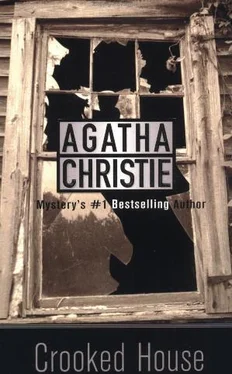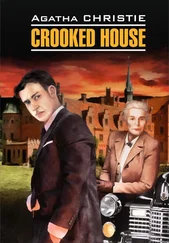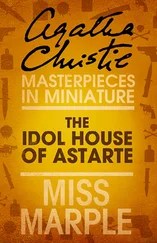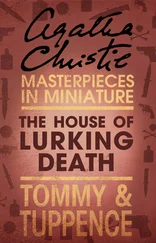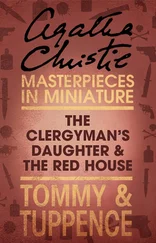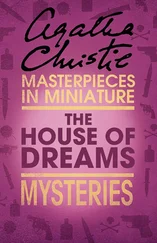Agatha Christie - Crooked House
Здесь есть возможность читать онлайн «Agatha Christie - Crooked House» весь текст электронной книги совершенно бесплатно (целиком полную версию без сокращений). В некоторых случаях можно слушать аудио, скачать через торрент в формате fb2 и присутствует краткое содержание. Год выпуска: 2002, ISBN: 2002, Издательство: St. Martin's Minotaur, Жанр: Классический детектив, на английском языке. Описание произведения, (предисловие) а так же отзывы посетителей доступны на портале библиотеки ЛибКат.
- Название:Crooked House
- Автор:
- Издательство:St. Martin's Minotaur
- Жанр:
- Год:2002
- ISBN:ISBN-13: 978-0312981662
- Рейтинг книги:4 / 5. Голосов: 1
-
Избранное:Добавить в избранное
- Отзывы:
-
Ваша оценка:
- 80
- 1
- 2
- 3
- 4
- 5
Crooked House: краткое содержание, описание и аннотация
Предлагаем к чтению аннотацию, описание, краткое содержание или предисловие (зависит от того, что написал сам автор книги «Crooked House»). Если вы не нашли необходимую информацию о книге — напишите в комментариях, мы постараемся отыскать её.
Crooked House — читать онлайн бесплатно полную книгу (весь текст) целиком
Ниже представлен текст книги, разбитый по страницам. Система сохранения места последней прочитанной страницы, позволяет с удобством читать онлайн бесплатно книгу «Crooked House», без необходимости каждый раз заново искать на чём Вы остановились. Поставьте закладку, и сможете в любой момент перейти на страницу, на которой закончили чтение.
Интервал:
Закладка:
"Is it a different will?" I asked. "I mean, does it dispose of his estate in a different way?"
"It does indeed," said Mr. Gaitskill.
My father was looking at me. Chief Inspector Taverner was very carefully -/^ i^i^iriCT at rne. Tn some way-» I f6^ vaguely uneasy…
Something was going on in both their minds - and it was a something to which I had no clue.
I looked enquiringly at Gaitskill.
"It's none of my business," I said. "But -"
He responded.
"Mr. Leonides's testamentary dispositions are not, of course, a secret," he said.
"I conceived it to be my duty to lay the facts before the police authorities first, and to be guided by them in my subsequent procedure. I understand," he paused, "that there is an - understanding, shall we say - between you and Miss Sophia Leonides?"
"I hope to marry her," I said, "but she will not consent to an engagement at the present time."
"Very proper," said Mr. Gaitskill.
I disagreed with him. But this was no time for argument.
"By this will," said Mr. Gaitskill, "dated November the 29th of last year Mr. Leonides, after a bequest to his wife of one hundred and fifty thousand pounds, leaves his entire estate, real and personal, to his granddaughter, Sophia Katherine Leonides absolutely."
I gasped. Whatever I had expected, it was not this.
"He left the whole caboodle to Sophia,"
I said. "What an extraordinary thing. Any reason?"
"He set out his reasons very clearly in the covering letter," said my father. He picked up a sheet of paper from the desk in front of him. "You have no objection to Charles reading this, Mr. Gaitskill?"
"I am in your hands," said Mr. Gaitskill coldly. "The letter does at least offer an explanation - and possibly (though I am doubtful as to this), an excuse for Mr.
Leonides's extraordinary conduct."
The Old Man handed me the letter. It was written in a small crabbed handwriting in very black ink. The handwriting showed character and individuality. It was not at all like the handwriting of an old man -except perhaps for the careful forming of the letters, more characteristic of a bygone period, when literacy was something painstakingly acquired and correspondingly valued.
"Dear Gaitskill (it ran)
You will be astonished to get this, and nrobablv offended. But I have my own reasons for behaving in what may seem to you an unnecessarily secretive manner. I have long been a believer in the individual. In a family (this I have observed in my boyhood and never forgotten) there is always one strong character and it usually falls to this one person to care for, and bear the burden, of the rest of the family. In my family I was that person. I came to London, established myself there, supported my mother and my aged grandparents in Smyrna, extricated one of my brothers from the grip of the law, secured the freedom of my sister from an unhappy marriage and so on. God has been pleased to grant me a long life, and I have been able to watch over and care for my children and their children.
Many have been taken from me by death; the rest, I am happy to say, are under my roof. When I die, the burden I have carried must descend on someone else. I have debated whether to divide my fortune as equally as possible amongst my dear ones - but to do so would not eventually result in a proper equality. Men are not born equal - to offset the natural inequality of Nature one must redress the balance. In other words, someone must be my successor, must take upon him or herself the burden of responsibility for the rest of the family. After close observation I do not consider either of my sons fit for this responsibility. My dearly loved son Roger has no business sense, and though of a lovable nature is too impulsive to have good judgement. My son Philip is too unsure of himself to do anything but retreat from life. Eustace, my grandson, is very young and I do not think he has the qualities of sense and judgement necessary. He is indolent and very easily influenced by the ideas of anyone whom he meets. Only my granddaughter Sophia seems to me to have the positive qualities required. She has brains, judgement, courage, a fair and unbiased mind and, I think, generosity of spirit. To her I commit the family welfare - and the welfare of my kind sister-in-law Edith de Haviland for whose lifelong devotion to the family I am deeply grateful.
This explains the enclosed document.
What will be harder to explain - or rather to explain to you, my old friend J - is the deception that I have employed.
I thought it wise not to raise speculation about the disposal of my money, and I have no intention of letting my family know that Sophia is to be my heir. Since my two sons have already had considerable fortunes settled upon them, I do not feel that my testamentary dispositions will place them in a humiliating position.
To stifle curiosity and surmise, I asked you to draw me up a will. This will I read aloud to my assembled family. I laid it on my desk, placed a sheet of blotting paper over it and asked for two servants to be summoned.
When they came I slid the blotting paper up a little, exposing the bottom of a document, signed my name and caused them to sign theirs. I need hardly say that what I and they signed was the will which I now enclose and not the one drafted by you which I had read aloud.
I cannot hope that you will understand what prompted me to execute this trick. I will merely ask you to forgive me for keeping you in the dark. A very old man likes to keep his little secrets.
Thank you 5 my dear friend, for the assiduity with which you have always attended to my affairs. Give Sophia my dear love. Ask her to watch over the family well and shield them from harm.
Yours very sincerely, Aristide Leonides."
I read this very remarkable document with intense interest.
"Extraordinary," I said.
"Most extraordinary," said Mr. Gaitskill, rising. "I repeat, I think my old friend Mr.
Leonides might have trusted me."
"No, Gaitskill," said my father. "He was a natural twister. He liked, if I may put it so, doing things the crooked way."
"That's right, sir," said Chief Inspector Taverner. "He was a twister if there ever was one!"
He spoke with feeling.
Gaitskill stalked out unmollified. He had been wounded to the depths of his professional nature.
"It's hit him hard," said Taverner. "Very respectable firm, Gaitskill, Callum amp; Gaitskill.
No hanky panky with them. When old Leonides put through a doubtful deal? he never put it through with Gaitskill?
Callum amp; Gaitskill. He had half a dozen different firms of solicitors who acted for him. Oh, he was a twister!"
"And never more so than when making his will," said my father.
"We were fools," said Taverner. "When you come to think of it, the only person who could have played tricks with that will was the old boy himself. It just never occurred to us that he could want to!"
I remembered Josephine's superior smile as she had said:
"Aren't the police stupid?"
But Josephine had not been present on the occasion of the will. And even if she had been listening outside the door (which I was fully prepared to believe!) she could hardly have guessed what her grandfather was doing. Why, then, the superior air?
What did she know that made her say the police were stupid? Or was it, again, just showing off?
Struck by the silence in the room I looked up sharply - both my father and Taverner were watching me. I don't know what there was in their manner that compelled me to blurt out defiantly:
"Sophia knew nothing about this! Noth|ing at all."
"No?" said my father.
I didn't quite know whether it was an agreement or a question.
"She'll be absolutely astounded!"
"Yes?"
"Astounded!"
There was a pause. Then, with what seemed sudden harshness the telephone on my father's desk rang.;
Читать дальшеИнтервал:
Закладка:
Похожие книги на «Crooked House»
Представляем Вашему вниманию похожие книги на «Crooked House» списком для выбора. Мы отобрали схожую по названию и смыслу литературу в надежде предоставить читателям больше вариантов отыскать новые, интересные, ещё непрочитанные произведения.
Обсуждение, отзывы о книге «Crooked House» и просто собственные мнения читателей. Оставьте ваши комментарии, напишите, что Вы думаете о произведении, его смысле или главных героях. Укажите что конкретно понравилось, а что нет, и почему Вы так считаете.
